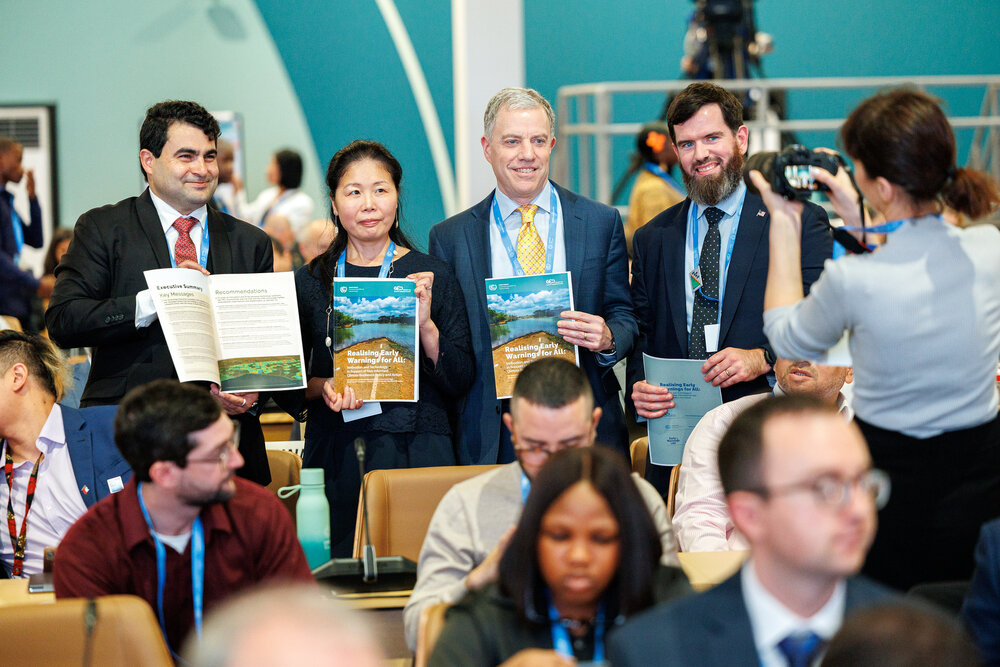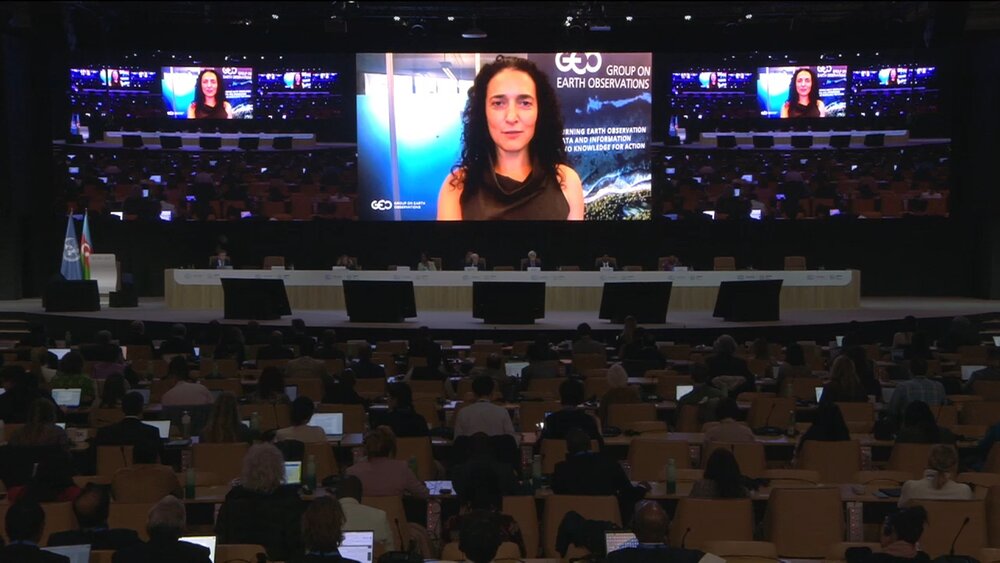Reflecting on COP29: Paving the way for Earth Intelligence and COP30

At a glance: What you need to know
- Climate finance commitment: COP29 saw agreement to triple climate finance to $300 billion annually by 2035, falling short of the $1.3 trillion that developing nations have been asking for to effectively adapt to and mitigate climate change.
- Systematic observations for EW4All: Since its launch in 2022, the Early Warnings for All (EW4All) initiative to achieve universal coverage of early warning systems by 2027 has become the central effort in climate adaptation. Systematic observation is key for EW4All, according to the Paris Agreement and recent COP decisions.
- GEO at COP29: At COP29’s Earth Information Day (EID), GEO presented the TEC-GEO policy brief, showcasing EO-based solutions for EW4All. GEO Members contributed to the EID discussion, featuring technological innovation for Earth observations.
- “GEO language” in negotiated text: Research and Systematic Observation (RSO) conclusions reflected the core message of the TEC-GEO policy brief and GEO’s inputs at EID. Reinforcing the need for open data-sharing and fit-for-purpose EO technologies, RSO conclusions validated GEO’s work as well as future direction set by the Post-2025 Strategy to advance Earth Intelligence for All.
- GEO coordination for COP30: RSO conclusions in 2004 noted GEO’s previous implementation plan, setting a precedent for endorsement of GEO’s Post-2025 Strategic Implantation Plan (SIP) at COP30 this year. Coordination within GEO will increase the likelihood of SIP endorsement in Belém.
Earth Intelligence for Early Warnings for All
The 29th Conference of the Parties (COP29) to the UNFCCC, held in Baku, Azerbaijan, showcased the Group on Earth Observations (GEO)’s ongoing efforts to advance innovation and technology.
From launching a joint policy brief with the UNFCCC Technology Executive Committee (TEC) to informing key discussions during Earth Information Day (EID), GEO’s leadership in advancing Earth Intelligence for climate resilience was prominently featured during the conference.
These efforts, including the GEO members’ use of AI with EO and contributions to the EW4All initiative, were well reflected in the conference’s Research and Systematic Observation (RSO) conclusions.
Dubbed the “Finance COP”, COP29’s key outcome was a commitment to triple climate finance to $300 billion annually by 2035 – far short of the $1.3 trillion requested by developing nations, especially those who suffer from climate-related disasters. Polarised negotiations, overshadowed by the US presidential election, left critical issues unresolved, including how to act on the global stocktake results, now deferred to COP30 in Belém, Brazil.
Despite these challenges, GEO’s activities demonstrated progress in critical areas. A milestone was the launch of the TEC-GEO policy brief, Realising Early Warnings for All: Innovation and Technology in Support of Risk-Informed Climate Resilience Policy and Action.
The brief highlighted Earth observation-based innovations essential for advancing the Early Warnings for All (EW4All) initiative, with an ambitious goal to ensure global early warning coverage by 2027.
Since its launch in 2022, EW4All has become the central effort of climate adaptation under the Paris Agreement. Recent COP decisions positioned the EW4All – supported by systematic observation – to be a priority, included in the outcome of the first global stocktake and the global goal on adaptation.

Endorsement to GEO’s work: from Baku to Belem
RSO negotiations incorporated GEO’s inputs extensively. The conclusions emphasized the vital role of EO systems, digital transformation and open data-sharing in closing technology gaps and supporting vulnerable populations.
GEO’s leadership was specifically noted in the policy brief, which underscored the need for fit-for-purpose solutions to enhance risk-informed climate resilience. The RSO conclusions essentially echoed GEO’s post 2025 strategy to promote co-creation of ‘Earth Intelligence’ to address gaps in technology development and deployment.
Looking ahead, GEO’s Post-2025 Strategy Implementation Plan (SIP), set for adoption in May, will shape its contributions to COP30. With Brazil emphasizing nature-based solutions, GEO initiatives like the Global Ecosystem Atlas are poised to make a key contribution to loss and damage assessments.
Just as in 2004, GEO members will once again come together in RSO negotiation in Belem to highlight GEO’s new SIP. Strategic coordination will ensure that the GEO community efficiently and effectively delivers transformative Earth Intelligence solutions to tackle the world’s pressing climate challenges.
Download Rui Kotani’s full report from COP29 here.